-
Disaffected youth, stagnation, poverty threaten Mideast regimes
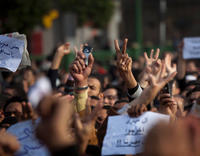
In six Arab-Muslim states in the Middle East, six — Egypt, Jordan, Morocco, Oman, Saudi Arabia, and Yemen — more than 50 percent of the citizenry are under the age of 25; in other six states — Bahrain, Kuwait, Lebanon, Qatar, Tunisia, and the United Arab Emirates — the “under 25s” make up between 35 to 47 percent of the population; in Yemen, some 75 percent of the population is under 30, and the poverty rate exceeds 45 percent; in Egypt, some 66 percent of the population is under 30, while fully half the country’s 80 million citizens lives on less than $2 per day; since 1980, the Arab world has experienced the highest rate of [population] growth of any region in the world; during the same period, the Arab economies have been sputtering, creating far too few jobs
-
-
Freshman lawmakers receive terrorism briefing
Last week new members of the U.S. House of Representatives were briefed on the current state of terrorism; their briefing warned that while al Qaeda had been disrupted it was still a dangerous organization; al Qaeda is increasingly turning to radicalization of American Muslims to carry out small scale attacks; the briefing also covered the delicate balance between expanded policing powers and civil liberties as Americans want security, yet are highly suspicious of the federal government; in moving forward the briefing urged lawmakers to candidly reassess costly security measures in light of growing fiscal concerns
-
-
Mubarak to step down after September elections
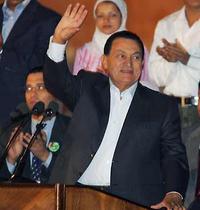
President Hosni Mubarak announced Tuesday that he will not seek reelection in September; he said on national TV that he will devote his remaining months in office to fashioning a constitutional reform; President Obama welcomed the announcement, saying that Egypt’s transition “must begin now”; he said the United States would be happy to offer assistance to Egypt during that process; Mubarak’s plan appears to divide Egyptians — and the protesters; some are determined to carry on, while others think these are major concessions and that the protests have gone far enough; Egypt’s powerful army vowed that it would not use force against the protesters, despite maintaining a strong presence in central Cairo
-
-
The threat: The Muslim Brotherhood
The Muslim Brotherhood, established in Egypt in the 1920s, is described by one scholar as “the mothership for the jihadi ideologies and thinking—- therefore one can say today’s Al Qaeda, and today many other jihadists, are off shoots of the Muslim Brotherhood”; among the Brotherhood’s graduates: Al Qaeda’s number two leader, the Egyptian doctor Ayman al-Zawahiri who was imprisoned for three years on weapons charges following President Anwar Sadat’s assassination in 1981; Hamas, the terror network behind suicide bombings and rocket attacks in Israel; the Islamic Jihad Movement in Palestine, whose goal is the destruction of Israel
-
-
Pro-government demonstrators clash with opponents
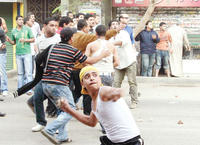
Thousands of pro-government demonstrators appear in Egypt’s major cities and clash with anti-government demonstrators; the anti-Mubarak protesters have been accusing the army of moving aside to let their pro-government rivals enter streets and square where anti-government protesters congregate; in a statement, Egypt’s army called for demonstrators to return to their homes; meanwhile, Internet services were returning to the country, having been cut off for days by the government; state television also reported an easing of a nationwide curfew
-
-
Stuxnet may turn Bushehr into a new Chernobyl
The destructive Stuxnet virus infected some 45,000 industrial control computers and servers in Iran; it destroyed more than 20 percent of Iran’s centrifuges, and, on 16 November, forced Iran to shut down uranium enrichment operations; it also infected the control system of the Bushehr reactor; Stuxnet is a sophisticated virus: while doing its destructive work, it makes sure that control computers continue to display “normal” operational information; one Russian expert described how engineers at Bushehr “saw on their screens that the systems were functioning normally, when in fact they were running out of control”; a new intelligence report says that with control systems disabled by the virus, an accident in the reactor is likely — an accident which would have the force of a “small nuclear bomb”
-
-
New Jersey's detention center expansion underway
With the growing number of deportations of illegal aliens from the United States, federal officials expect demand for space to rise within coming years; Newark county officials are awaiting approval by federal authorities to upgrade and expand the Essex County Correctional Facility, significantly increasing its detainee capacity. The county’s proposal would provide a less punitive setting for detainees along with improved medical care, amenities, and federal oversight
-
-
U.S., Egypt look to post-Mubarak era
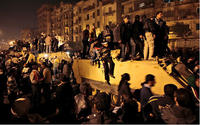
The days of Hosni Mubarak in office appear numbered, and there are behind-the-scenes discussions among U.S., Egyptian, and Saudi diplomats about a “smooth transition”; it is not yet clear whether the efforts to ease Mubarak out are meant to allow the military regime which came to power in 1952 to remain in power, headed by more acceptable leaders than Mubarak, or whether these efforts are aimed at a more thorough revamping of the Egyptian political system; the main goal is to prevent a repetition of the Iran 1979 scenario: an authoritarian regime replaced by a centrist, secular — but weak and devoid of support — government, only for that government to be swept from power by the Ayatollahs within months
-
-
Iranian suicide-bombing book found in Arizona desert
A book celebrating suicide bombers has been found in the Arizona desert just north of the U.S.- Mexican border; last year DHS had in custody thousands of detainees from Afghanistan, Egypt, Iraq, Iran, Pakistan, Saudi Arabia, and Yemen; U.S. Border Patrol statistics indicate that there were 108,025 OTMs — or illegal immigrants other than Mexicans — detained in 2006, compared to 165,178 in 2005 and 44,614 in 2004
-
-
Western analysts, Israel: Egyptian regime will weather the storm
Israeli and western analysts agree Egyptian regime will remain as popular uprising gains strength while government clamps down on protesters; little to no concern of Muslim Brotherhood takeover: government shuts down Internet access, cellular service, and other personal communications in an effort to contain the rebellion as turmoil spreads across Egypt; journalists under assault; former IAEA chief El-Barradai under house arrest; ruling party headquarters set ablaze
-
-
U.S. ditching terror color warning system

By the end of April, terror threats to the United States will no longer be described in shades of green, blue, yellow, orange and red; the new plan for a terrorism alerts system calls for notifying specific audiences about specific threats; in some cases, it might be a one-page threat description sent to law enforcement officials describing the threat, what law enforcement needs to do about it, and what the federal government is doing, one of the officials said; the five-tiered color-coded terror warning system, created after the terrorist attacks of 9/11, was one of the Bush administration’s most visible anti-terrorism programs; the use of colors emerged from a desire to clarify the nonspecific threat information that intelligence officials were receiving after the 2001 attacks
-
-
U.K. changes terrorist surveillance procedures
U.K. home secretary announces changes in manner in which terrorist suspects may be detained and questioned; modifications are in response to claims of overreaction to 9/11 and the London bus bombings; critics claim changes not enough
-
-
New, interactive 2011 counterterrorism resource available
The national Counterterrorism Center has developed a multi-media Web site which offers useful information on terrorism; among other things, the site offers an an interactive map with information on specific terrorist activities and their relative geographical locations, as well as an interactive timeline that features wanted and captured terrorists, and other terrorism-related events
-
-
Moscow airport blast to force security rethinking
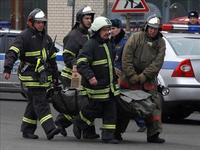
Experts say it is significant that those who masterminded the Moscow attack chose to bomb the arrivals hall of the airport — Moscow’s busiest — because it was an easier target than the heavily-policed departures area; one expert says: “Arrivals has always been thought of as the ‘soft’ area of an airport —- Nobody is flying anywhere, the baggage has all been screened, because it has been on planes already, and crucially, people are leaving the airport. It’s very rare that you ever saw somebody carrying a bag in to arrivals”; airports may begin screening people who come to meet friends and family at arrivals; “What will happen is that the barrier will get further and further back, so no longer is it just at departures, but at the airport door, or in some cases on the road as you drive up to the terminal,” says the expert
-
-
In Illinois, you could go to prison for using your Blackberry
Illinois is one of twelve states with “two-party consent” eavesdropping laws on the books; audio recording a civilian in Illinois is a felony with up to three years in prison the first time you do it and up to five years if you do it again; the penalties are much stiffer, though, if you record certain people: audio-recording a law-enforcement officer, state’s attorney, assistant state’s attorney, attorney general, assistant attorney general, or judge in the performance of his or her duties is a Class 1 felony, punishable by up to fifteen years in prison
-
More headlines
The long view
Factories First: Winning the Drone War Before It Starts
Wars are won by factories before they are won on the battlefield,Martin C. Feldmann writes, noting that the United States lacks the manufacturing depth for the coming drone age. Rectifying this situation “will take far more than procurement tweaks,” Feldmann writes. “It demands a national-level, wartime-scale industrial mobilization.”
No Nation Is an Island: The Dangers of Modern U.S. Isolationism
The resurgence of isolationist sentiment in American politics is understandable but misguided. While the desire to refocus on domestic renewal is justified, retreating from the world will not bring the security, prosperity, or sovereignty that its proponents promise. On the contrary, it invites instability, diminishes U.S. influence, and erodes the democratic order the U.S. helped forge.
Fragmented by Design: USAID’s Dismantling and the Future of American Foreign Aid
The Trump administration launched an aggressive restructuring of U.S. foreign aid, effectively dismantling the United States Agency for International Development (USAID). The humanitarian and geopolitical fallout of the demise of USAID includes shuttered clinics, destroyed food aid, and China’s growing influence in the global south. This new era of American soft power will determine how, and whether, the U.S. continues to lead in global development.
Water Wars: A Historic Agreement Between Mexico and US Is Ramping Up Border Tension
As climate change drives rising temperatures and changes in rainfall, Mexico and the US are in the middle of a conflict over water, putting an additional strain on their relationship. Partly due to constant droughts, Mexico has struggled to maintain its water deliveries for much of the last 25 years, deliveries to which it is obligated by a 1944 water-sharing agreement between the two countries.
How Disastrous Was the Trump-Putin Meeting?
In Alaska, Trump got played by Putin. Therefore, Steven Pifer writes, the European leaders and Zelensky have to “diplomatically offer suggestions to walk Trump back from a position that he does not appear to understand would be bad for Ukraine, bad for Europe, and bad for American interests. And they have to do so without setting off an explosion that could disrupt U.S.-Ukrainian and U.S.-European relations—all to the delight of Putin and the Kremlin.”
How Male Grievance Fuels Radicalization and Extremist Violence
Social extremism is evolving in reach and form. While traditional racial supremacy ideologies remain, contemporary movements are now often fueled by something more personal and emotionally resonant: male grievance.
